John Baluyut, a New Canaan High School senior, once believed that love could only happen between and among close friends and family.
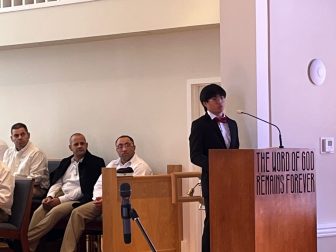
New Canaan High School senior and ABC scholar John Baluyut at the annual celebration of the life of the Rev. Dr. Martin Luther King Jr., held Jan. 20, 2025 at the United Methodist Church of New Canaan. Credit: Michael Dinan
Yet after arriving in New Canaan, the ABC House scholar told a crowd of more than 150 people on Monday morning, he “learned that love is more than that.”
“Although the first month of moving here can be overwhelming, being in an environment that fostered love from people that were strangers to me a few weeks ago gave me an experience that I’ve never had before,” Baluyut told those gathered inside the United Methodist Church of New Canaan during a celebration of the life of the Rev. Dr. Martin Luther King Jr.
He continued: “It opened my eyes to the fact that love is more than a feeling from family and friends—it is a transformative force capable of mending broken relationships, bridging divides and making enemies turn into friends.”
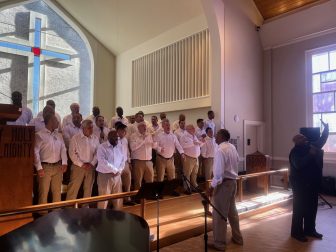
The Men’s Choir from Pivot Ministries at the annual celebration of the life of the Rev. Dr. Martin Luther King Jr., held Jan. 20, 2025 at the United Methodist Church of New Canaan. Credit: Michael Dinan
Baluyut struck a note that would resound throughout the moving ceremony, organized by the Interfaith Council of New Canaan. It featured a welcome from the Rev. Gilbert Burgess of the Community Baptist Church, music from the Men’s Choir at Pivot Ministries, the trio of Khanisha Moore (vocals), Peterson Prime (piano) and Justin Merveille, and Nerva Altino of the Congregational Church of New Canaan, an interfaith prayer for peace led by Jennifer Zonis, president of the Interfaith Council, testimony from Baluyut and NCHS sophomore Dariel Ortiz, an invocation from the Rev. Martha Epsein of UMC, keynote address from the Rev. Richard Williams, pastor of Pivot Ministries, and benediction led by Monsignor Rob Kinnally of St. Aloysius Church. Those in attendance included the full Board of Selectmen—First Selectman Dionna Carlson and Selectmen Steve Karl and Amy Murphy Carroll, as well as other municipal officials, local clergy and representatives from ABC House of New Canaan, including Moore, the organization’s resident director, Executive Director Jamie Boris and Board of Directors President Liz Tuff.
Baluyut said that he has felt tensions arise at times among his classmates at NCHS, yet as his understanding of love grew, “I realized that the root cause of this formation of enemies is a lack of understanding.”
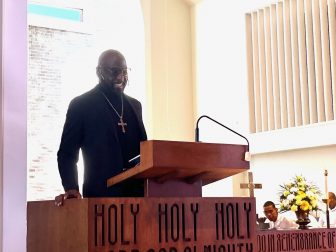
The Rev. Richard Williams of Pivot Ministries at the annual celebration of the life of the Rev. Dr. Martin Luther King Jr., held Jan. 20, 2025 at the United Methodist Church of New Canaan. Credit: Michael Dinan
“When thinking of an enemy, the natural response is thinking of what they have done to frustrate you or hurt you,” he said. “But I learned that being able to address the situation with an open mind and empathy, you can fix tense friendships and grow from the experience. As I met new people in wrestling, church and school, I also learned love isn’t only about liking somebody, but it is offering kindness, patience and willingness to break down barriers. Taking the initiative and reaching out to peers and friends with a simple, friendly gesture, you can foster relationships and bonds that last a lifetime. Although when you’re young, love can only be seen as a feeling from family and friends, love at its purest form can be strong enough to fix anything that was once broken.”
It’s a theme that ran throughout Williams’s address, titled “Loving Your Enemies,” which started with a vivid picture of Memphis on April 4, 1968—the day King was assassinated.
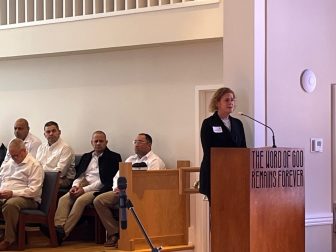
Interfaith Council of New Canaan President Jen Zonis at the annual celebration of the life of the Rev. Dr. Martin Luther King Jr., held Jan. 20, 2025 at the United Methodist Church of New Canaan. Credit: Michael Dinan
“Why revisit the pain of inequality, why revisit the profound loss that it brought?” Williams said. “Friends, it’s only through understanding the depth of that tragedy and the message King left behind that we can confront a question that challenges us even today: How do we respond to hate? How do we respond to hate? King’s answer was radical, but it was resolute: Love your enemies. Love your enemies. Even in the face of such hatred and violence in his final days, King preached, ‘Love your enemies.’ He understood love as a transformative power, a remedy to heal and build a society rooted in justice and equality.”
It’s an important message given that the world has grown “increasingly more contentious,” he said, “especially with all the politics and things wrapped up in life like never before.”
Williams challenged those in attendance to consider why they should love their enemies, and offered three reasons. First, because “hate destroys that hater” as well as the hated.
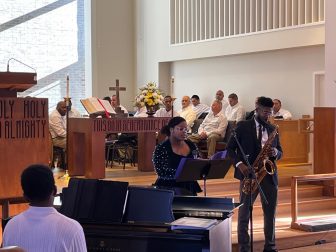
L-R: pianist Peterson Prime, vocalist Khanisha Moore and saxophonist Justin Merveille. At the annual celebration of the life of the Rev. Dr. Martin Luther King Jr., held Jan. 20, 2025 at the United Methodist Church of New Canaan. Credit: Michael Dinan
“We often focus on how hate hurts its target, but friends and truth hate damages the hater most of all,” Williams said. “Friendship will be harmed by hatred and festers within us like a cancer. It consumes our peace. It poisons our souls. Have you ever carried a grudge so heavy that it began to seep into every corner of your life, shaping your thoughts, dictating your actions, and redefining who you are?”
Secondly, “love has redemptive power,” Williams said.
“When we choose to love those who oppose us, it’s an opportunity,” he added. “It opens a door to something extraordinary: Reconciliation. When we love our enemies, we tap into the redemptive power at the very root of love.”
And finally, we must learn to love our enemies because “it reflects the character of God,” Williams said. He cited Matthew 5:44-45, where Jesus says, ‘Love your enemies and pray for those who persecute you, that you may be children of your Father in heaven.’
“Friends, when we love our enemies, we are children,” Williams said. “We mirror His divine nature.
He then challenged those in attendance to consider just how to love one’s enemy, saying that King would have us start “by looking at ourselves.”
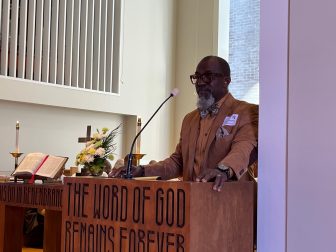
The Rev. Gilbert Burgess of the Community Baptist Church, an Interfaith Council of Ne wCanaan member, at the annual celebration of the life of the Rev. Dr. Martin Luther King Jr., held Jan. 20, 2025 at the United Methodist Church of New Canaan. Credit: Michael Dinan
“Allowing us to confront our own flaws,” Williams said. “Allowing us to confront our own biases. Friends, this is self-reflection. Self-reflection. Before pointing the fingers at others, we must examine our own hearts. We must confront our own capacity for wrongdoing. None of us are without fault… Friends, when we see our own flaws, it becomes easier to show grace. It becomes easier to forgive others.”
When anger and pride fade away, “humility becomes to grow,” Williams said.
“With humility comes the ability to understand, choosing love and reconciliation over judgment and blame,” he said. “When we understand our own struggles, and when we extend grace to ourselves, friends, it’s easier to offer the same compassion to others. This prevents bitterness from taking root, and it allows love to flourish where hate may have begun to grow. So our self-reflection humbles our hearts and it opens our eyes to other flaws. It’s then we can take the next step in loving our enemies. Friends, we can love our enemies by seeing the good in them.”
Finally, Williams said, the way to learn to love our enemies is through forgiveness, which he called “the bridge that makes real change possible.”
“Without forgiveness, loving our enemies remains just a simple idea instead of a life changing truth,” Williams said. “King profoundly observed, he who is devoid of the power to forgive, It’s the void of the power to love. This truth underscores that loving our enemies is impossible without first embracing the ongoing practice of forgiving those who hurt us. Forgiving those who oppose us. And friends, forgiveness is not optional. Forgiveness is essential. It’s essential to spiritual growth. It’s essential to healing. It means choosing to let go of anger and pain rather than letting hurts become walls between us. Through forgiveness, we free ourselves of hatred’s poison. We choose a better path.”
While noting that it’s not easy to forgive, Williams added that in his own faith, the Lord’s Prayer teaches us to “forgive us our trespasses, as we forgive those who trespass against us.”
“So as we gather here in this space today, honoring the life and legacy of Dr. King in New Canaan, or how relevant this message remains today—in this world of ours today, fractured by division, hatred, fear,” Williams said in conclusion. “We live in an era where political ideologies divide family with the right of identity, where social media amplifies hostility instead of understanding, where acts of violence are met with calls of retaliation rather than reconciliation. That’s our world today. So I challenge each one of us today. Dare to love your enemies. Dare to love your enemies. Dare to love them. Rise above petty grievances and deep wounds. Choosing to forgive over bitterness. Let us remember King’s words: ‘I would rather die than hate you.’ I would rather die than hate you. Let’s live out this dream, friends, not just in the marches and the speeches, but through daily acts of radical love toward friend and foe. For if we truly believe in justice, if we truly believe in equality, if we truly believe in peace, then loving our enemies is not optional. It’s essential.”
He received a standing ovation for the address.
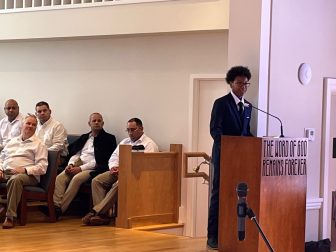
New Canaan High School sophomore and ABC scholar Dariel Ortiz at the annual celebration of the life of the Rev. Dr. Martin Luther King Jr., held Jan. 20, 2025 at the United Methodist Church of New Canaan. Credit: Michael Dinan
In his remarks, Ortiz, an ABC scholar, recalled a moment when he himself had stepped outside his comfort zone and was rewarded with a new and better perspective.
Such moments, “while daunting and at times confusing, hold power to transform us profoundly,” Ortiz said.
He continued: “For me, this journey began as a young child growing up in the Bronx. My world was confined to the glories of my neighborhood, a place that I believed defined who I was and who I could become. Venturing beyond those borders seemed an insurmountable challenge, an unattainable dream. Over time, I began to view those who lived outside of my small sphere with skepticism and even resentment. They represented a world I felt that I could never access. That perspective was challenged when I was given the opportunity to attend high school outside of the Bronx. Initially, I rejected the very idea. The thought of engaging with people so unlike those that I had grown up with filled me with apprehension to a large extent. I built walls within my mind, convinced that stepping into an unfamiliar environment would only lead to discomfort and fear.”
Yet, Ortiz said, his own father decided that he would enroll at the ABC program in New Canaan,”a decision that would ultimately change my life in ways that I could have never anticipated.”
“This choice compelled me to confront my fears and embrace the unknown,” he continued. “And as the days passed and the start of the year approached, I grappled with the challenge that lay ahead. I realized that in order for me to thrive in my new environment, I had to learn to welcome diversity, not only to others, but within myself. I had to unlearn the biases and fears I had nurtured and replace them with understanding and love. Day by day, I began to see the value in connecting with people who were different from me. These interactions broadened my perspective and enriched my understanding of the world. The uneasiness that I once felt was gradually replaced with a sense of belonging and acceptance. The lessons I learned during this time have shaped my character and remain with me to this day. Dr. Martin Luther King Jr. once said, ‘Love is the only force capable of transforming an enemy into a friend.’ This powerful truth has deeply influenced my life.”
By following that dictum, Ortiz said, he’s been able to “overcome my fears and dismantle the barriers that I had set up and created in my mind.”
“Love, unwavering and unconditional, has the power to transform not only our relationships with others, but our relationships with ourselves,” he said. “There’s no greater feeling than the peace that comes from being content with who you are and where you stand in the world. For me, that peace was achieved in the act of loving and understanding others, even those I once viewed with suspicion or fear. It is a lesson I’ll carry with me always, and it is one that I hope to share with all of you today.”
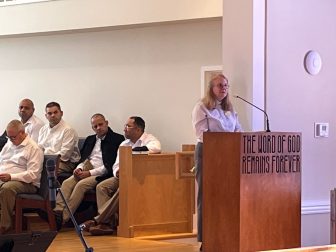
United Methodist Church of New Canaan pastor the Rev. Martha Epstein at the annual celebration of the life of the Rev. Dr. Martin Luther King Jr., held Jan. 20, 2025 at UMC. Credit: Michael Dinan
In the invocation, Epstein called on the gathering to honor King’s past and the role he will play in the future, leading the congregation in the following prayer: “Oh God, let us pray not just with our words, but with our hands. Let us not pray just with what we say, but with what we do. Let us pray not just with what we intend, but with the witness of our lives. Let us pray not just with what we dream, but with our boots on the ground. Let us pray to remind ourselves and to remind each other of who we are, of whose we are, and especially of who we are called to be as the beloved community. We thank you, oh God, for this beautiful gathering, the witness and work of all those gathered here together. For the strength and the hope and the courage in this room, that we may take it out when we go and bring it into the world. May we be of strength and courage and help to others, that our hope might be theirs and that we may truly work for justice in all that is love and light.”
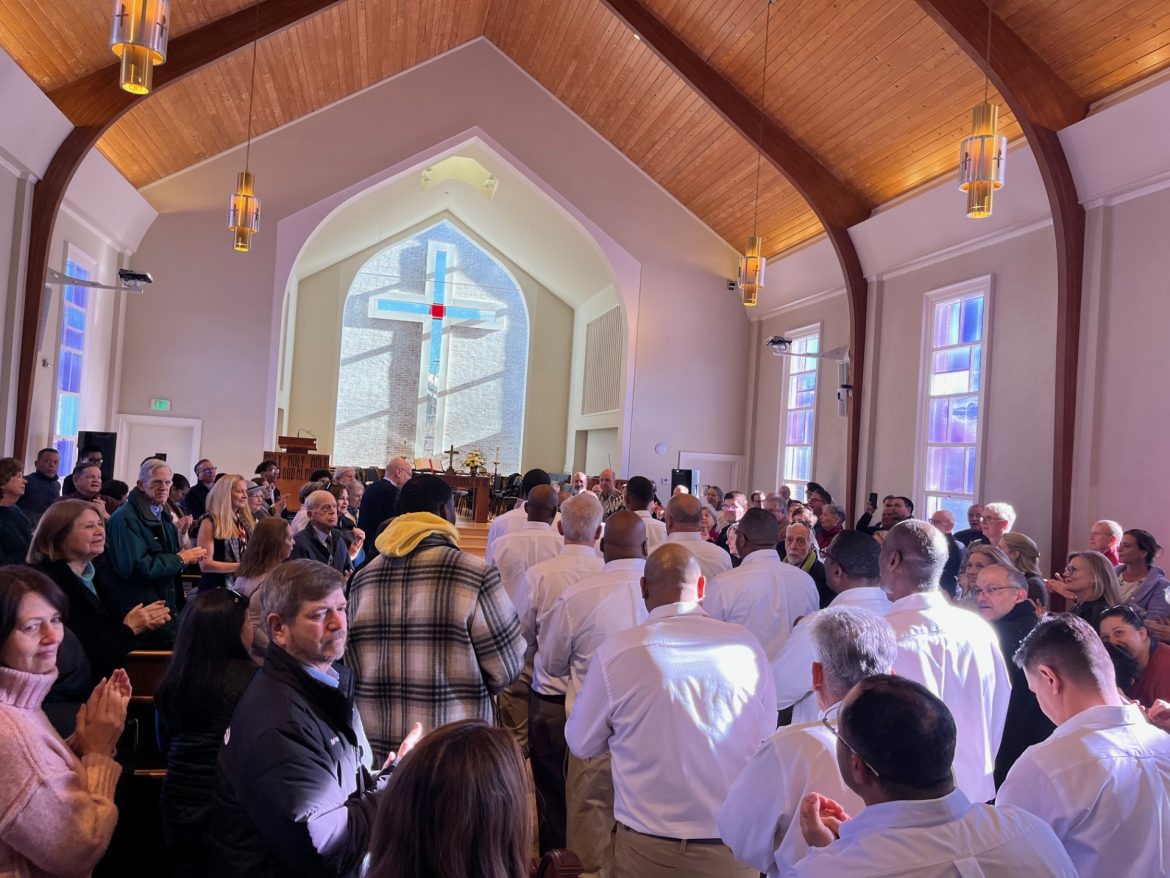
What a magnificent and life-changing ceremony with brave and holy people – the greatest legacy to Martin Luther King, Jr. Thank you for the full picture – will share this with others. I wish I was there.
It was a beautiful ceremony with deeply-inspiring words shared by people from all walks of life. As the news of the day unfolded, I was able to focus on what really matters: love. Thanks for the excellent recap.
Wow, those are two powerful testimonies by ABC students of the power of Love and Dr Martin Luther King Jr. This piece resonates.